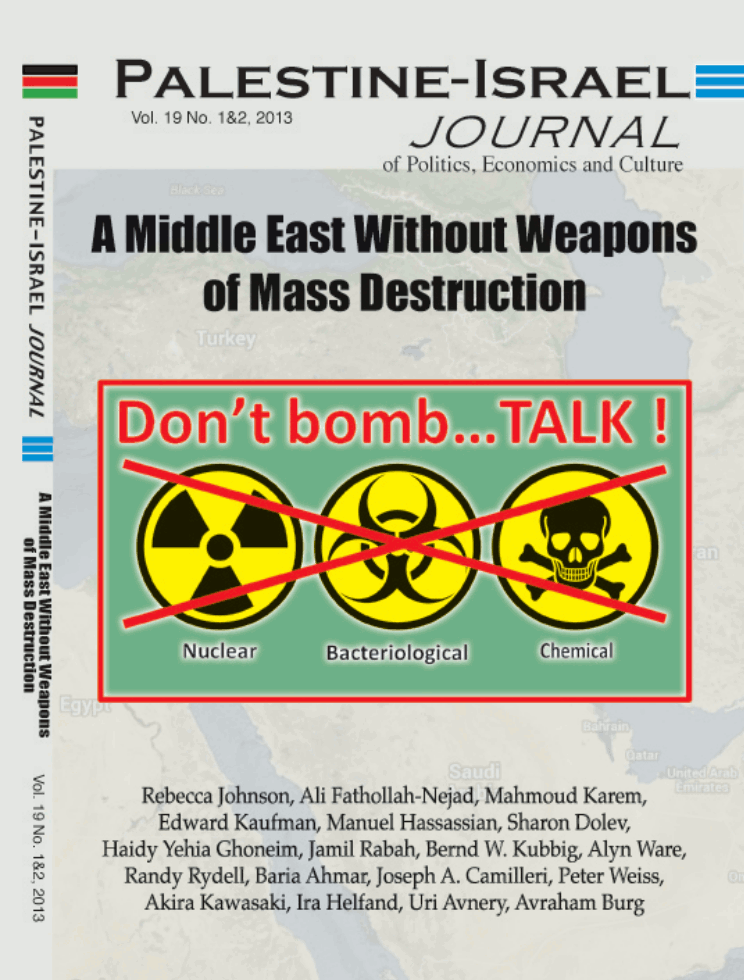International concern over the need to establish a Middle East Zone Free of Nuclear Weapons and Weapons of Mass Destruction (WMD) is not attracting enough attention. The failure to date to reach an international arrangement over the Iranian nuclear program, the problems created by Israel's nuclear ambiguity policy, the fear of a nuclear arms race in the region, and the pushing of radical Islamic groups to the corner are increasingly posing a threat to regional security and stability in the Middle East.
Public opinion in the Middle East is focused more on daily life and politics. But this fact by itself should make us more worried. Neglecting or underestimating this danger will not make it vanish. On the contrary, it makes us all more vulnerable.
The Palestine-Israel Journal (PIJ) is interested in keeping this issue alive on the regional and international agenda. In March 2010, we devoted an issue of the PIJ to this topic, and since then we have been involved in organizing and participating in a number of important regional and international conferences on the topic. They have involved dialogue among all the relevant regional parties and efforts to raise public awareness in Israel and the neighboring Arab countries about the need to cleanse the region of nuclear threats and all WMD, including chemical and biological weapons.
One of the primary goals of these encounters was to provide civil society input and recommendations for the international conference on a nuclear weapons- and WMD-free zone in the Middle East that was supposed to take place in Helsinki during 2012, in accordance with the resolution of the NPT Review Conference in New York in May 2010. Unfortunately, the conference was postponed, many believe primarily due to the reluctance of Israel to engage in serious discussion about the topic, and to the U.S. position of trying to accommodate Israel while avoiding coming to grips with the issue as the primary nuclear power in the world. The impasse in the peace talks between Israel and the Palestinians should not be an excuse to hinder or delay real engagement in a process leading to a new Middle East Zone Free of Nuclear Weapons and WMD. Progress on both tracks is badly needed, whether separately or concurrently. The threat of conventional armed conflict is more realistic than a nuclear one. The geographical and territorial dimensions of the Middle East make using nuclear weapons or WMD destructive across borders for all regional parties.
This does not underestimate the contribution of achieving a political settlement to the Arab-Israeli conflict to the process of creating a Middle East Zone Free of Nuclear Weapons and WMD or to stability and prosperity in the region. The key to such stability and prosperity is a resolution of the Palestinian-Israeli conflict based upon ending the Israeli occupation and implementing the two-state solution. This will help direct all resources toward development and construction, not destruction.
In this regard, the international effort to ensure that Iran does not and will not seek nuclear weapons or nuclear capability should be encouraged, supported, and enhanced within a wider approach of a regional commitment to the process of creating a nuclear weapons- and WMD-free zone.
One of the primary goals of this issue of the PIJ is to create a resource which can be used as a tool by all in the region and the international community who are concerned with the quest for a WMD-free zone in the Middle East. This issue will be accompanied and followed by a series of public events and discussions to deepen awareness and encourage open debate over the threats of nuclear weapons and WMD.
The PIJ will continue its involvement in various activities aimed at achieving a political settlement to the Israeli-Palestinian conflict, an end to the occupation, and the establishment of an independent Palestinian state on the 1967 borders with agreed-upon swaps and with East Jerusalem as its capital. These activities will be conducted alongside all other efforts to focus attention on the dangers of nuclear weapons and the need for a Middle East Zone Free of Nuclear Weapons and WMD.

